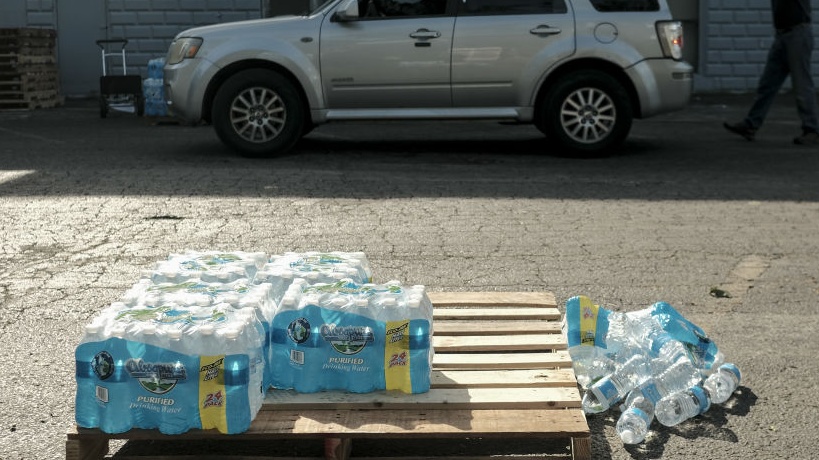Update (Oct. 20, 2021): As residents continue to express concerns over the drinking water in Brenton Harbor, Michigan, city commissioners unanimously declared a state of emergency, the Associated Press reports.
“We've heard the cry of the people. Anything the mayor needs from this commission, we’re going to work with him tooth and nail," Commissioner Duane Seats said.
Gov. Gretchen Whitmer visited the city on Tuesday to address the issue, ABC News reports.
"Every Michigander deserves safe drinking water," Whitmer said, adding that she visited Benton Harbor "to hear from community leaders doing the work on the ground and residents living through water challenges every day."
According to a statement from the governor’s office, it will cost about $30 million to replace all of the lead service lines in Benton Harbor. The statement adds that the state has earmarked about $18.6 million so far.
The governor urged the state legislature to expedite the replacement of lead pipes and service lines, asking for an additional $11.4 million investment to expedite the process in the predominantly Black community within the next 18 months. Whitmer hopes to secure the funds from federal money made available to the state through the pandemic-era American Rescue Plan.
During her visit, the governor highlighted the magnitude of the crisis at the moment.
"I cannot imagine the stress that moms and dads in Benton Harbor are under as they emerge from a pandemic, work hard to put food on the table, pay the bills and face a threat to the health of their children," she said. "That's why we will not rest until every parent feels confident to give their kid a glass of water knowing that it is safe."
Original (Oct. 19, 2021): After hearing complaints from advocates who expressed concerns about the drinking water in Benton Harbor, Michigan, Gov. Gretchen Whitmer has announced a plan to replace all lead pipes by April 2023.
Benton Harbor is made up of more than 84% Black people, according to World Population Review.
The directive, issued on Thursday, comes a month after advocates filed a petition to the Environmental Protection Agency and demanded a federal intervention to resolve the crisis, ABC News reports.
Whitmer said lead service line replacements are now scheduled to be completed in 18 months, expediting the process, which was originally expected to take up to five years.
"For six consecutive sampling periods over the last three years, the Benton Harbor water system has failed to meet the regulatory standard for lead," Whitmer stated on Thursday.
Last week, city officials urged residents to use bottled water for drinking, cooking and brushing their teeth due to elevated levels of lead in water testing. Residents are also getting free bottled water or low-cost drinking water testing and health services. Additionally, the Michigan Department of Health and Human Services is providing baby formula that does not require the mixing of water.
“I cannot imagine the stress that moms and dads in Benton Harbor are under as they emerge from a pandemic, work hard to put food on the table, pay the bills and face a threat to the health of their children," Whitmer said. "We will not rest until the job is done and every parent feels confident to give their kid a glass of water knowing that it is safe."
Rev. Edward Pinkney, president of the grassroots Benton Harbor Community Water Council, said the petition has played a vital role in bringing attention to the issue.
"I am more than happy that Whitmer is now taking this a little bit more seriously," Pinkney said. "But, I want her to tell the people that the water is unsafe to drink rather than saying this is out of 'an abundance of caution.'"
The city's water, sourced from Lake Michigan, has shown elevated lead levels for several years. The CDC states that lead exposure can harm brain development in children and cause health problems for adults.
Advocates who filed the recent petition said 51% of the 5,877 service lines in Benton Harbor "are known to contain lead, are known to be galvanized lines previously connected to lead, or are of unknown material but likely to contain lead."
Jeremy Orr, who joined a coalition of 20 groups to file a petition to the EPA, said Black residents are disproportionately impacted by the crisis.
"85% of Benton Harbor’s residents are Black and 45% of all people of color there have an income below the federal poverty level," Orr wrote in an opinion piece for Blavity. "It comes as no surprise that when lead-contaminated water was discovered earlier this July in Clarksburg, West Virginia — which is 90% white — the Environmental Protection Agency (EPA) immediately issued an Emergency Administrative Order. Meanwhile, the people of Benton Harbor have been waiting for the safe drinking water they deserve for almost four years."
Michigan was thrust into the national spotlight in 2014 and 2015 when the city of Flint experienced a similar crisis.
"Flint residents spoke up for the whole world to hear," Orr said. "The Flint water crisis has served as a warning to the nation of what happens when you don’t take care of your water infrastructure and refuse to listen to the community. The Michigan Civil Rights Commission concluded the poor governmental response was a 'result of systemic racism.'”
Orr, who is a senior attorney at the Natural Resources Defense Council, said the state still hasn't learned its lesson after Flint.
"We’re back at square one just a few towns away," he wrote. "I’m a staunch advocate for safe water, but we shouldn’t have to fight for it in every Black town, especially in a state that has been through this before."

